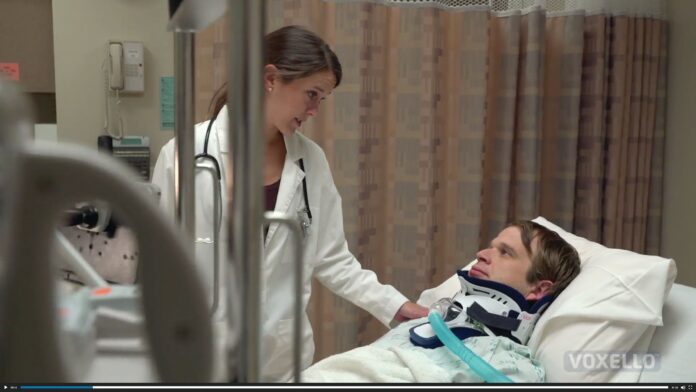
Communication between caregiver and patient can often be hindered if the patient has a physical impairment. Coralville-based Voxello creates tools to improve communication in a hospital setting. PHOTO VOXELLO
By Angela Holmes
angela@corridorbusiness.com
Voxello, a Coralville-based medtech company, is providing a much-needed service to hospitalized COVID-19 patients and their caregivers while trying to develop a new version of its technology.
The company, formed in 2013 under the Iowa Medical Innovation Group at the University of Iowa, is behind the Noddle, a device for hospital patients who are unable to use normal modes of communication to summon help from a nurse or caregiver, whether it be from paralysis, the placement of a breathing tube or ventilator, or some other physical impairment. It uses sensors to detect small, voluntary actions that can allow patients to control multiple devices including nurse call systems and speech-generating devices.
After receiving U.S. Food and Drug Administration clearance in 2017, the Noddle gained traction and has been used in several major hospitals in the United States, including in Boston, St. Louis and Denver.
“It’s been used with a wide range of patients from pediatric to adult,” said Chief Scientific Officer Richard Hurtig, who is also professor emeritus in the Department of Communication Sciences and Disorders at the UI’s College of Arts & Sciences. “Some of these patients only need the Noddle switch because they are able to speak, but they’re just so physically limited. The Noddle allows them to use the smallest intentional gesture, whether it’s a tongue click or talking to the cheek or a little shoulder shrug to access the nurse call system.”
Communication barriers between patients and caregivers intensified as the COVID-19 pandemic spread around the world earlier this year. Patients on ventilators are unable to speak, and the layers of personal protective equipment used by health care providers makes it difficult for patients to hear and understand what people are saying, Mr. Hurtig said.
“What complicates things even more for them is the no-visitor restrictions. There aren’t family members or patient advocates or interpreters available at their bedside,” he noted.
While devices like the Noddle can assist in these situations, hospitals lacking the technology are looking for simple, low-cost ways to keep the lines of communication open. To that end, Mr. Hurtig recently joined a task force formed through the Patient-Provider Communication Forum (PPC) to provide free communication materials online to health care providers on the frontlines of the pandemic.
On the PPC website, Voxello provides printable hospital communication materials including communication boards that address pain scale, basic medical questions and mechanical ventilation discussions, among others. Noddle-chat vocabulary files included on all Voxello devices also have been provided for free download through various apps used in health care settings.
“If people have the hardware that runs the software, they can download this for free now,” Mr. Hurtig said. “We’ve also made available for free download stuff that can just be printed off right on the printers in the ICU [intensive care unit] as a low-tech communication tool.”
The downloadable materials provided on the PPC website are available in nine different languages and have been used in more than 100 countries. The simplicity of the materials save hospitals both time and money as they don’t have to buy equipment and train staffers on how to use it.
“We made it so if you print them off two-sided, on the back of each of these boards are instructions for the caregivers in terms of how to use that board,” Mr. Hurtig said. “It’s giving people just-in-time instruction on how to use these communication tools.”
While communication may seem like a secondary concern for patients who are fighting for their lives, Mr. Hurtig insisted it is a critical pathway for avoiding further medical complications, such as adverse reactions to medications, aspiration pneumonia or pressure ulcers.
“If we don’t address these communication barriers, in addition to the patient suffering, there are tremendous costs that the health care system has to absorb,” Mr. Hurtig said. “The sooner you can get people out of critical care, the more likely you are to not have preventable adverse events. From a public policy health perspective, putting in a little bit of effort to make sure communication is flowing has a dramatic impact on health care costs.”
Startup challenges
While the COVID-19 crisis has demonstrated a strong need for the products that Voxello creates, it has also exposed the fragility of the business and investment environment for startups.
“As everybody is, we are in a really tight situation,” Mr. Hurtig said. “As an early-stage company, we’ve developed the product, we’ve placed it, but we’re not generating huge revenues.”
Voxello is working on a “Noddle 2.0” but needs another round of investment to take it to the next level.
“It was never easy, and COVID has made everybody nervous about treading water, let alone putting $3-$5 million into a company,” he noted. “Iowa has always been sort of a hard place to raise money. There aren’t a lot of local investors in the biomedical area.”
Although there isn’t much competition in the market for medical communication devices, there isn’t much for hospitals to compare it to, either.
“There are advantages of being the only one in the game because you in principal don’t have competitors, but on the other hand, you are novel,” Mr. Hurtig said. “That becomes a challenge for us because investors want to see large amounts of sales and large numbers of units and don’t appreciate that we have to grow in an organic way. It’s both exciting but it’s also a challenge. I’m keeping my fingers crossed that we’ll be lucky and COVID-19 will not derail us.” CBJ




